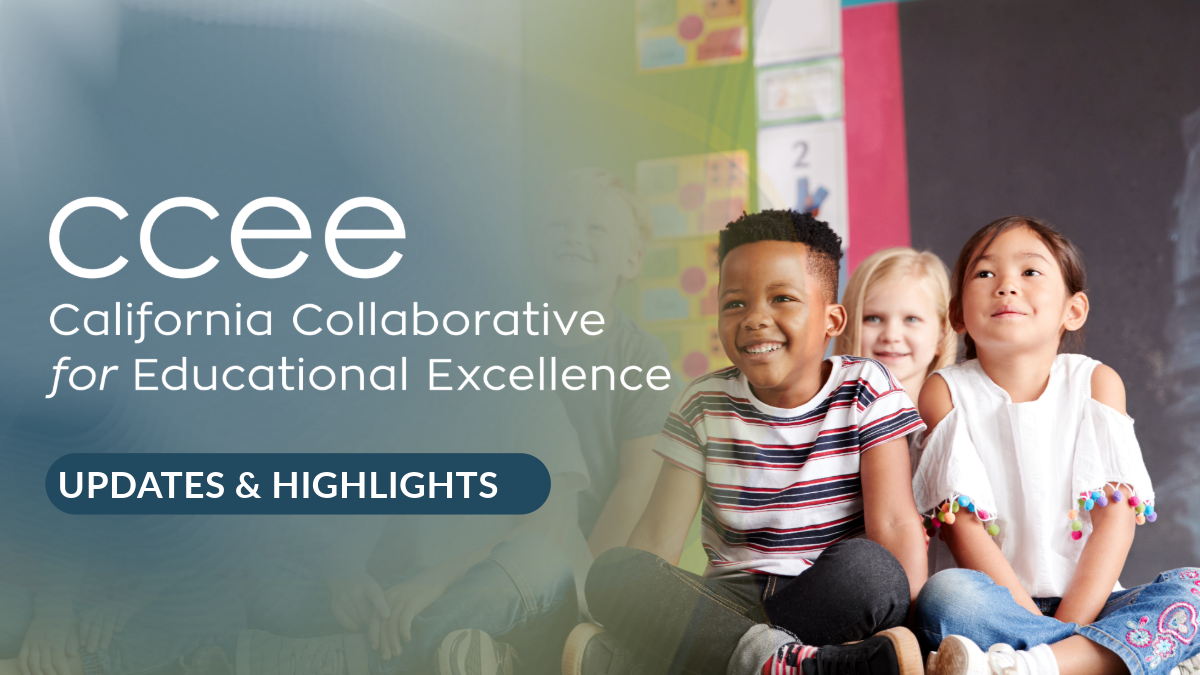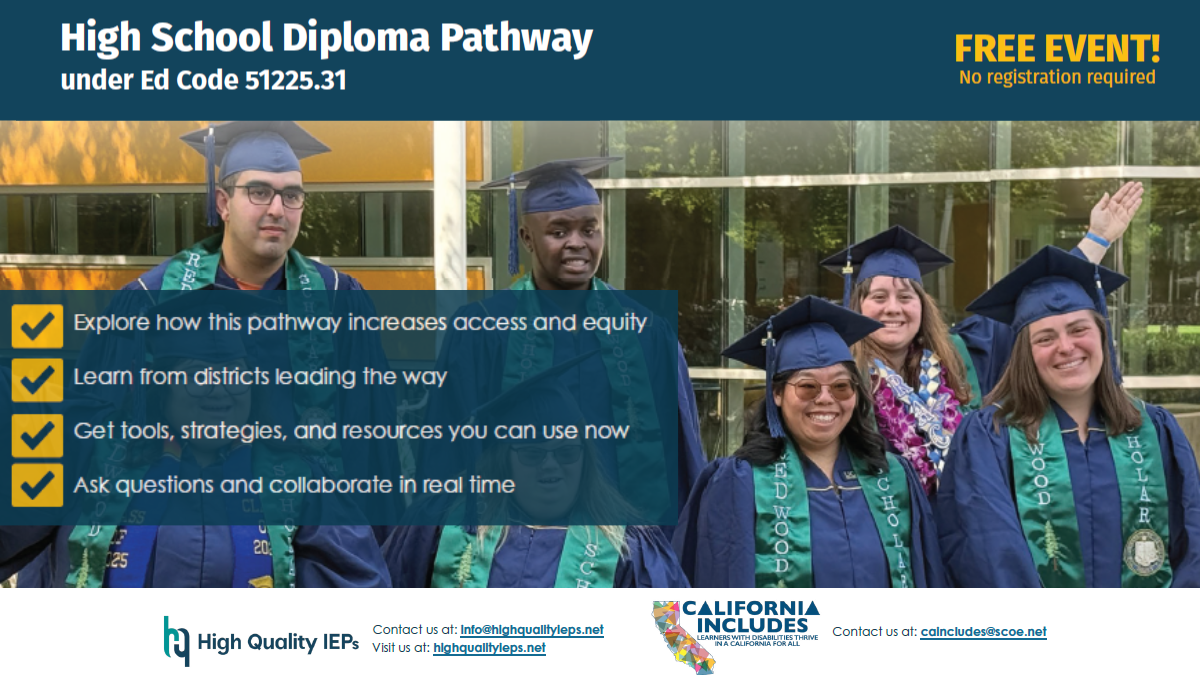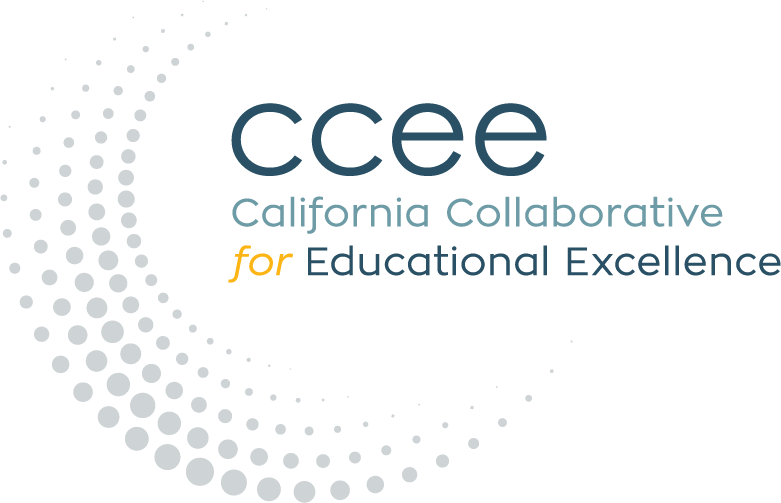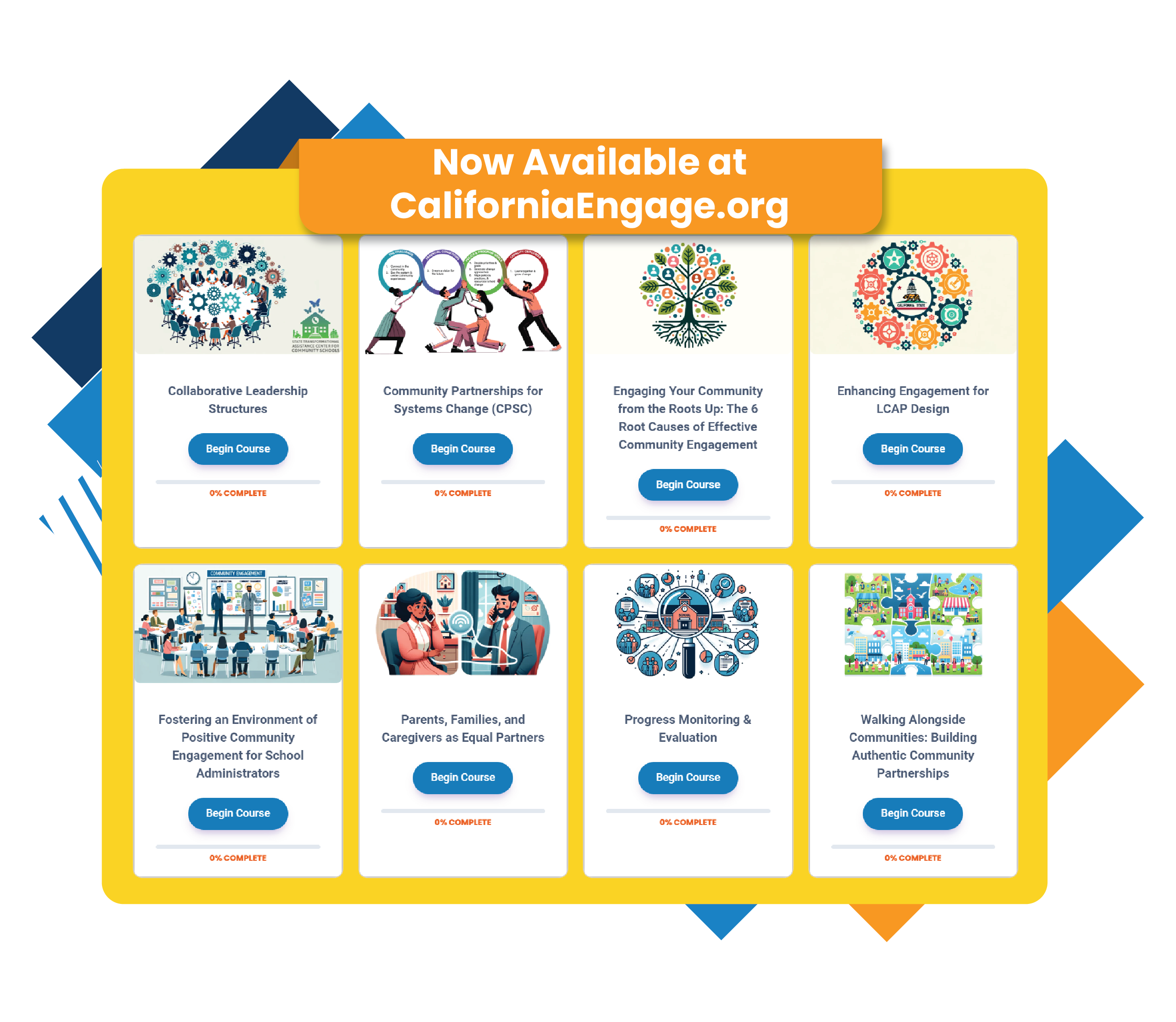Category: featured posts
Hot Topic from Matt Navo: Legislative Report on High Quality Online Instructional Materials
Statewide System of Support News: High School Diploma Pathway
New! Statewide System of Support Virtual Conference
NEW! SSOS Core Working Group Report
Development and Delivery of Resources and Services to Support the Community Engagement Initiative (CEI)
DESCRIPTION
The Community Engagement Initiative (“CEI”) was established by the California State Legislature and the Governor on June 27, 2018 (Section 140 of Assembly Bill No. 1808 (“AB 1808”), Chapter 32 of the Statutes of 2018).
The CCEE is seeking proposals to enhance multifaceted professional learning plans and resources aimed at deepening pupil, family, and community engagement. These plans should increase the knowledge and capabilities of local communities, educational agencies, and school staff. Proposals should address one or more of the following content areas, which may include but are not limited to:
- Training on how to discuss complex topics such as race, language, and disability, recognizing community expertise, and sharing power.
- Involving local educational agencies and school staff in these trainings to enhance their knowledge, skills, and dedication to improving engagement with pupils, families, and communities.
- Prioritizing the perspectives of pupils, families, and communities in decision-making processes.
- Using metrics to assess the effectiveness of community engagement within communities and school districts.
- Developing collaborations with community-based organizations.
CCEE is issuing this RFP to invite applicants to respond to one or more of the Content Areas and Methods of Delivery described above.
The selected Respondent will be expected to work closely with, and under the supervision of, assigned CCEE project staff to complete each of the activities outlined above, including the identification, review, development, and delivery of the professional learning resources, services and programs.
Proposals Accepted Through: Monday, September 2, 2024, at 4:00p.m. PST
REQUEST FOR PROPOSALS (RFP)
QUESTIONS FROM RESPONDENTS (Due By: Friday, June 7, 2024, at 4:00 p.m. PST)
NOTIFICATION TO THE PUBLIC (Post Date: )
Point of Contact: Jasmine Hennessy ([email protected])
Last Updated: Wednesday, May 29, 2024
CCEE Connection (April 2024)
News & Announcements
Open Door Sessions
CCEE, in collaboration with LEAs and partner organizations, is hosting “Open Door” sessions to share best practices, tools/resources, and strategies to support student learning. These sessions provide opportunities for county office and/or district staff to listen and learn from other LEAs across the state.
Click on the links below to register for upcoming Open Door sessions.
- 4/9/24 at 3pm (TODAY!)- The Power of Data Partnerships: District Data Sharing Through the Local Assessment Project
- 4/26/24 at 2pm – Schools and Climate Impact Disasters
- 4/30/24 at 3pm – Strengthening Coherence Across Initiatives: A Whole-Child Lens
Missed a session? Below are links to archived materials from past Open Door Sessions:
Please check our Events Calendar or follow CCEE on Twitter and LinkedIn to stay up-to-date on all our offerings.
LEA Spotlights
The Spotlights Project aims to celebrate some of the innovative, inclusive, and shareable practices that LEA teams have implemented to improve outcomes for students across our state. Each Spotlight organizes the successes, challenges, and lessons learned in a way that calls attention to emerging practices, reproducible strategies, and applicable resources, in hopes of introducing accessible points of conversation for other LEAs looking to resolve similar issues.
Below are three recently published Spotlights. Click on the links below to learn more about the innovative practices taking place in these LEAs.
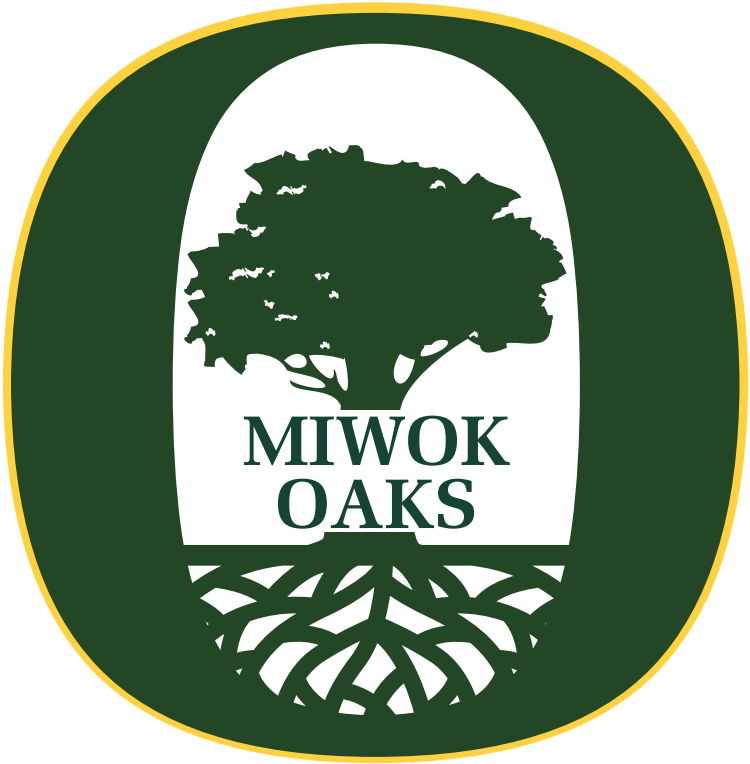
Miwok Middle School, located in Sacramento City USD, harnessed the power of student survey data to cultivate a culture of belonging and connectedness — with an explicit focus on equity.
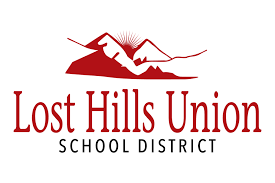
Lost Hills UESD leveraged community schools as a catalyst for collaboration among neighboring small districts, focusing on shared learning and resource pooling to enhance student outcomes.
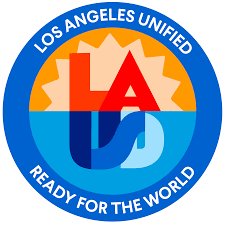
Los Angeles USD launched its Black Student Achievement Plan, a comprehensive initiative that aims to address the need for culturally responsive curriculum and instruction, community-based partnerships within the Black community, and increased staffing to support the academic and social-emotional needs of Black students.
2024-25 Leadership Institute
Register for the 2024-2025 Leadership Institute! The Leadership Institute will kick off in person on July 21, 2024 in Newport Beach, CA.
The ultimate goal of the Leadership Institute is to create networks and support systems for small school district leaders so they can gain the skill set and confidence needed to effectively lead their districts.
Click here for a flyer.
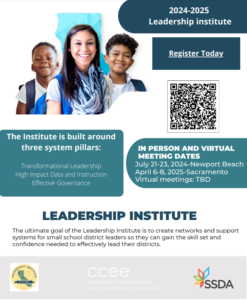
21csla research-practice webinar
Mark your calendars for the upcoming 21CSLA webinar scheduled for May 15th from 3:30-4:30 PM PT via Zoom. Join us as we welcome Professor Tyrone Howard from UCLA School of Education & Information Studies. Dr. Howard will delve into the themes of his recent publication, ‘Equity Now,‘ providing invaluable insights on fostering equity and inclusivity in educational settings. Register for the webinar today!
About the I3 Center
The Innovation, Instruction, and Impact (I3) Center implements a statewide approach to improving LEA capacity by collaboratively developing, delivering, sharing, and spotlighting practices that have demonstrated the power to improve outcomes for students.
About the CCEE
The California Collaborative for Educational Excellence is a statewide leader delivering on California’s promise of a quality, equitable education for every student.
Executive Director’s Corner
By Matt J. Navo, Executive Director

Learning is the cornerstone of growth and progress in education, shaping individuals, communities, and organizations alike. Within our Innovation, Instruction, and Impact (I3) Center’s learning networks, leaders from local educational agencies (LEAs) share invaluable insights on the transformative power of learning.
From collaborative intelligence to hands-on experiences, they emphasize the profound impact of continuous learning. Partners echo this sentiment, emphasizing the crucial role of education in fostering climate sustainability. Spotlighting institutions like Miwok Middle School, Lost Hills UESD, and Los Angeles USD underscores the tangible results of prioritizing learning initiatives. As we anticipate upcoming Open Door sessions and reflect on past ones, we’re reminded of the ever-evolving journey of knowledge acquisition and its endless possibilities for improvement and innovation.
Harnessing the Power of Collective Learning to Foster a Culture of Inquiry and Innovative Change
Most educators, if not all, have come into this profession because they recognize the value of learning. Whether they’re teaching in bustling classrooms or engaging in virtual learning spaces for their own professional growth, educators are continuously enriched by the collective knowledge and experiences of their students, colleagues, and the many voices shaping their educational journey. Through CCEE’s learning networks, we strive to create intentional learning communities where these educational leaders can lean into the power of learning as active learners who are committed to improving the practices, programs, and systems in their local educational agencies (LEAs). District and county office leaders learn with and from one another, as they embrace each other’s diverse perspectives and experiences to shape innovative solutions that continue to be refined through data-driven iterative processes.
We asked LEA leaders in each of our learning networks to reflect on their own journeys of learning and leading to ultimately improve outcomes for students. They share their thoughts below.
African American Student Success (AASS) Network
By Tracy Thompson, Executive Director of Juvenile Court and Community Schools, San Diego COE
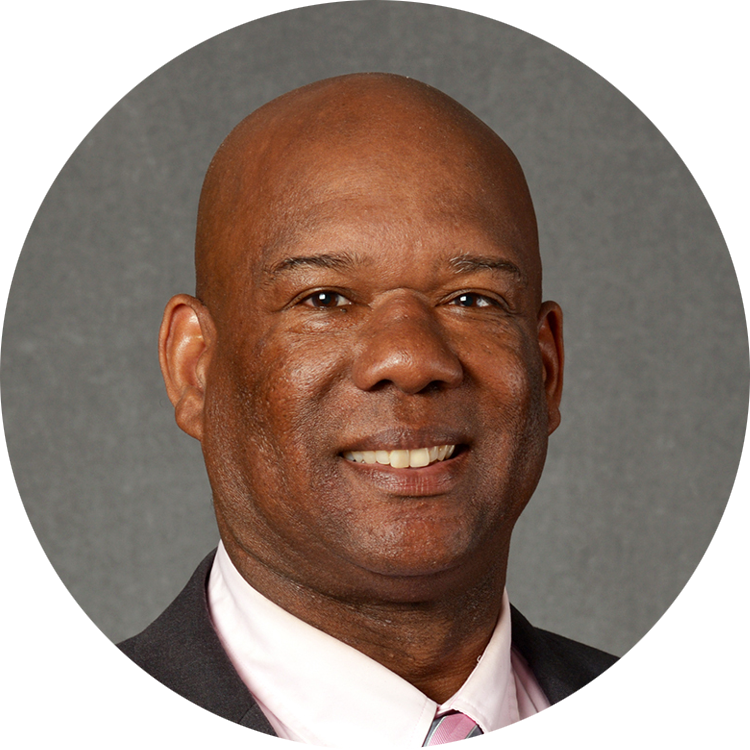
I’m delighted to announce that the partnership between the San Diego County Office of Education, Juvenile Court and Community Schools (JCCS) team, and the California Collaborative for Educational Excellence (CCEE) has proven immensely valuable to our organization, particularly in our efforts with the county’s most marginalized students. This enriching journey has highlighted the critical need to not only analyze and discuss data but to also utilize these insights to create meaningful change. Participation in this network and collaboration with local educational agencies (LEAs) statewide have provided our team with vital support, leadership, and encouragement from colleagues facing similar challenges and sharing the same goals. While we recognize the importance and tremendous opportunity presented by this partnership, we also understand the struggle, especially when progress is slower than anticipated, necessitating pivot and persistence. We’ve discovered this partnership to be a safe environment for honesty, courage, and continual growth, benefiting our students and society as a whole. While acknowledging that change takes time, we’re reassured that we’re not alone, and meaningful progress relies on our collective action.
Data Research Learning Network (DRLN)
By Kit Bragg, Director of Assessment, Research, & Evaluation, San Ramon Valley USD

Participating in the Data Research Learning Network (DRLN) has been incredibly rewarding. The focused and action-oriented process by which the CCEE/DRLN conducts research is evidence-based and results-driven. My work was pushed so much further under the guidance of the network team. Beyond that, the collaboration across the network elicited new thinking and new direction in my action plan. The opportunity to collaborate and present with team members further broadened my own research and affirmed the efforts driven by our plan. I most enjoyed learning from my colleagues about data literacy tools created within the network. My focus was wholly on dashboarding for the purpose of intervention tracking. Seeing the tools developed by my colleagues to increase data literacy pushed my thinking and allowed me to design some staff professional development differently.
Universal Design for Learning (UDL) Network
By Tim Reid, Director of Pupil Services, Nevada Joint UHSD

Being part of the UDL network reinforced the value of collaborative support among leaders, emphasizing the need for a collective effort in driving effective change. This has been a pivotal lesson in understanding the multifaceted nature of educational leadership and the importance of shared experiences and strategies among peers. My key takeaway is the realization that there’s no singular method to effectuate significant change. The diversity of approaches, enriched by the collective wisdom and creativity of the network, underscores the dynamic nature of educational leadership. This collaboration offers a unique opportunity for mutual support, allowing us to share insights and challenges. Moreover, it prompts us to ask targeted questions that lead to the refinement and improvement of our practices.
As LEAs engage in our learning networks, we are curating tools, resources, and artifacts that come out of their projects, in hopes that it can be a jumping off point for other LEAs hoping to embark on their own learning journeys. We updated the Learning Networks Resource Hub with new additions so make sure to check it out!
Is Your School Climate Ready?
By Ingrid Roberson, Assistant Director of Research Learning

As Earth Day this April 22nd reminds us of our rapidly changing climate, CCEE has partnered with UndauntedK12 and Ten Strands, two organizations dedicated to assisting K-12 public schools in acting on climate adaptation, mitigation, and education. UndauntedK12 and Ten Strands are currently conducting a statewide survey to gather model tools and resources aimed at supporting school infrastructure, climate resilience, adaptation, and decarbonization.
The initiative will kick off with the first of three Open Doors sessions scheduled on April 26th, focusing on “Schools and Climate Impact Emergencies” (registration link). Additionally, for the upcoming 2024-2025 school year, CCEE, UndauntedK12, and Ten Strands plan to share stories and resources from school communities across California. These tools will aim to empower schools, districts, and counties to drive action towards climate adaptation, mitigation, and education. A policy and practice brief will accompany the toolkit, featuring a summary of findings, resource links, spotlight stories, and policy recommendations.
NEW! Statewide System of Support Resource Hub
CCEE Connection (January 2024)
News & Announcements
Open Door Sessions
CCEE, in collaboration with LEAs and partner organizations, is hosting “Open Door” sessions to share best practices, tools/resources, and strategies to support student learning. These sessions provide opportunities for county office and/or district staff to listen and learn from other LEAs across the state.
Below are archived materials from past Open Door Sessions:
Please check our Events Calendar or follow CCEE on Twitter and LinkedIn to stay up-to-date on upcoming Open Door sessions.
LEA Spotlights
The Spotlights Project aims to celebrate some of the innovative, inclusive, and shareable practices that LEA teams have implemented to improve outcomes for students across our state. Each Spotlight organizes the successes, challenges, and lessons learned in a way that calls attention to emerging practices, reproducible strategies, and applicable resources, in hopes of introducing accessible points of conversation for other LEAs looking to resolve similar issues.
Below are three recently published Spotlights. Click on the links below to learn more about the innovative practices taking place in these LEAs.

Districts across California are partnering with Scaling Student Success to develop graduate profiles that more equitably and holistically redefine student success, transforming how they support students in developing the skills, competencies, and mindsets needed to thrive in college, career, and life.
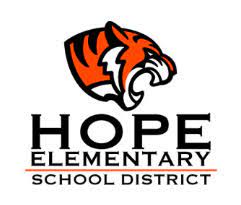
Hope ESD‘s commitment to transparency and data-driven decision-making is empowering students to own their educational journey, nurturing a community of lifelong learners.

Federal Terrace Elementary School participated in CCEE’s Intensive Assistance Model Project, receiving intensive onsite support from Solution Tree to redefine collaboration and transform their Professional Learning Community.
About the I3 Center
The Innovation, Instruction, and Impact (I3) Center implements a statewide approach to improving LEA capacity by collaboratively developing, delivering, sharing, and spotlighting practices that have demonstrated the power to improve outcomes for students.
About the CCEE
The California Collaborative for Educational Excellence is a statewide leader delivering on California’s promise of a quality, equitable education for every student.
Executive Director’s Corner
By Matt J. Navo, Executive Director

Having a statewide view helps our organization better understand what’s working and what’s not working. This is particularly important when it comes to how educational professionals engage best for professional learning. Time and time again, we hear two desires: 1) we want to learn from our peers and 2) we want to see how others are doing “it” – “it” being whatever it is we are trying to learn. This newsletter explores the various learning networks and peer-to-peer learning opportunities being used to support educators’ desires to learn.
Learning Networks: Fostering Collaboration, Including the New I3 Learning Network Resource Hub

By Ingrid Roberson, Assistant Director of Research Learning
On November 15th, the Innovation, Instruction, and Impact (I3) team hosted our first Cross-Network Convening, bringing together 19 districts and counties from across the state who are engaged in our African American Student Success Network, Data Research Learning Network (DRLN), and our newly added Universal Design for Learning Network. The theme for the convening was Street Data: Making Data Meaningful to the Lives of Students, Teachers, & Families.
At the start of the Convening, participants listened to district and county experiences with street data from Dr. Kimberly Hendricks-Brown (Fresno USD) and Fawn Nielsen (Imperial COE). Attendees then had network-specific time to learn more about Street Data in the context of their network learning. For example, in the DRLN, districts and counties conducted a data inventory at the satellite, map, and street data levels for their Innovation Projects. The event culminated in a showcase where each district and county shared their Problems of Practice, highlighting ideas and insights on how street data might enhance progress monitoring and measuring impact.
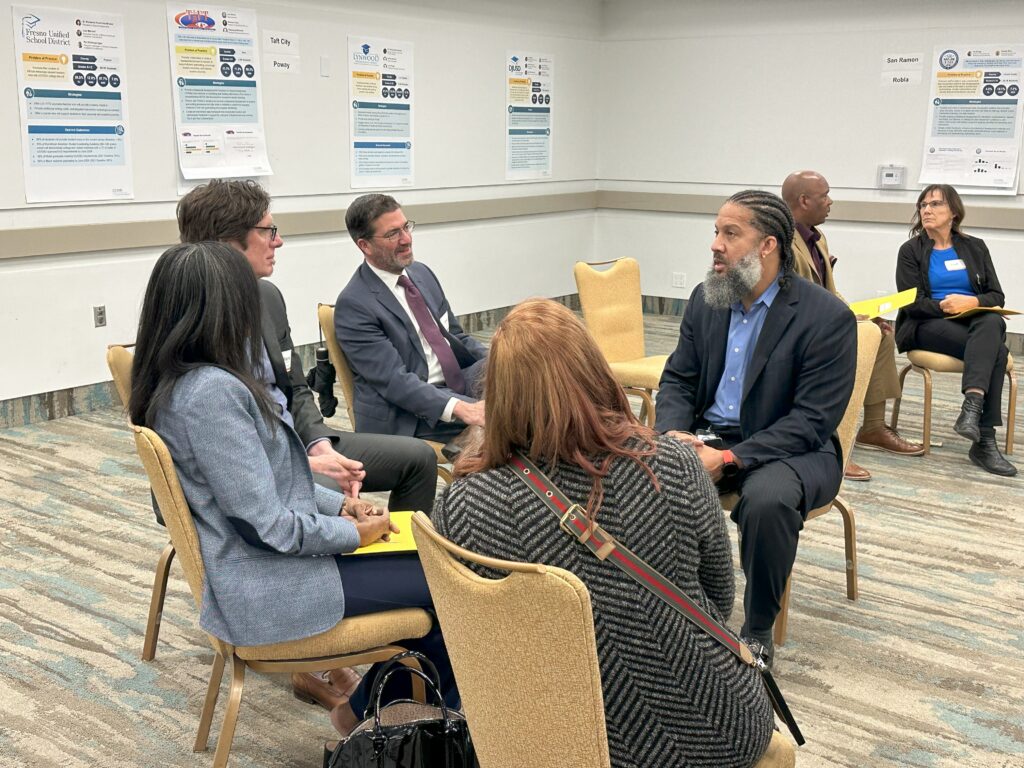
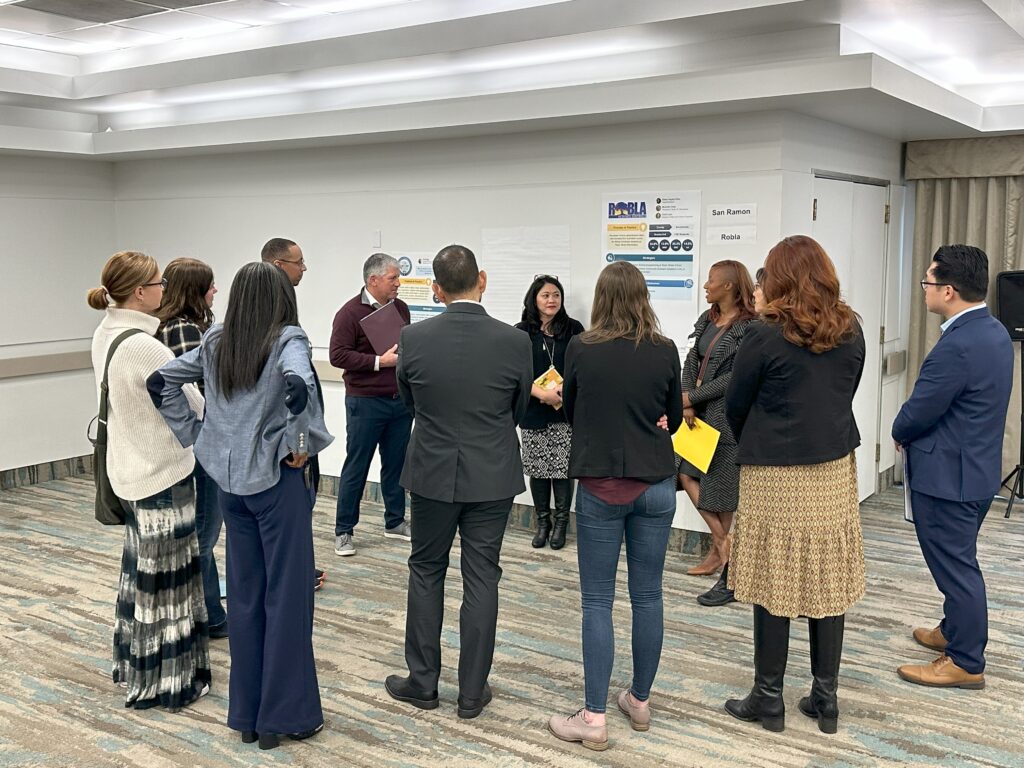
To foster continued cross-network connections, I3 is excited to launch the I3 Learning Networks Resource Hub. The Hub provides a one-stop shop for resources emerging out of learning network projects from districts and counties representative of the state of California. For example, the Hub includes teacher and student surveys created by the Center for Assessment focused on formative assessment practices that foster student agency from the DRLN’s Rincon Valley Union School District. As one learning network member shared at the convening, “Cross networks are the safety nets we all need when we work to lead,” capturing the supportive spirit of collaboration.
Focusing on African American Student Achievement: Addressing the Growing Gap
By Sujie Shin, Deputy Executive Director &
Italo Ciccarelli, Program Specialist


Amidst the ongoing challenges presented by the COVID-19 pandemic, district leaders are grappling with its disproportionate impact on minority and at-risk student groups, notably exacerbating the pre-existing achievement gap for African American students.
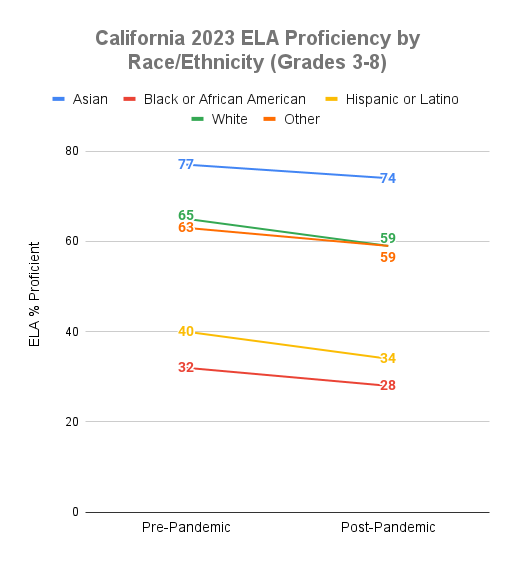
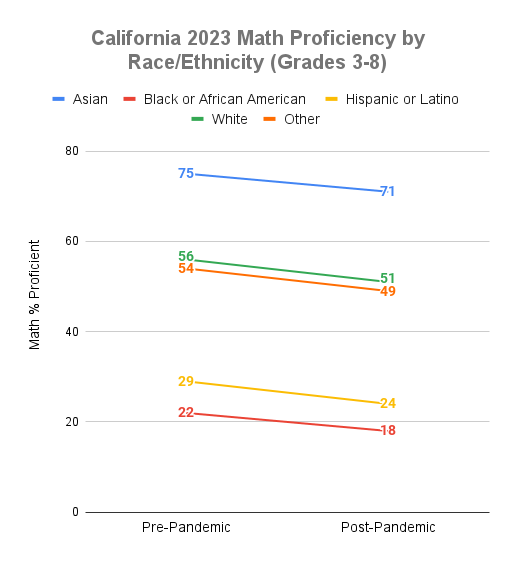
Examining these challenges is the focus of the African American Student Success Network (AASSN), who, in collaboration with the California Association of African-American Superintendents and Administrators (CAAASA) is engaging in shared cycles of inquiry to better understand the gaps in access, opportunity, and outcome for African American Students. The participating district and county office teams have come together around a common area of focus, collectively addressing implementation challenges, and distilling and disseminating lessons learned and best practices.
LEA Learning Networks: Recognizing and Amplifying Success
The seven Local Educational Agency (LEA) teams have been testing systems change processes over the past two years to improve learning, achievement, and educational attainment outcomes for Black students.
By establishing deep trusting relationships with partnering school district, and county office leaders to participate in shared cycles of inquiry, the networks create a platform for collaborative problem-solving centered on a common area of focus. This collaborative approach aims to address specific problems of practices (PoP) in our African American Student achievement and related strategies to improve student outcomes and reduce the achievement gap. For instance, the AASSN participants are actively working on strategies such as improving career and college readiness for Black students in the Central Valley, decreasing the overidentification of African American students in Special Education, enhancing Math CAASPP standards for African American students in the 6th grade, and mitigating the overrepresentation of African American male students receiving non-passing grades in core classes.
During this second-year cycle, participants have focused on delving deeper into implementation and data monitoring to study the effects of the proposed strategies and learning from it. Some LEAs already show promising signs of their implemented strategies coming to fruition. For example, Lynwood USD is showing a 17% reduction in Ds and Fs in core classes for male African American students in grades 9 to 12 (2023-24 AASSN Handout) from their baseline in SY 2021-22. The San Diego County Office of Education has seen a promising 19.8% reduction in chronic absenteeism rates among African American/Black students across the four Community Schools Program sites tested (CCEE & San Diego COE, CERA 2023) in the same period. We are excited to continue partnering with our network leaders as they actively contribute to dismantling systemic barriers and fostering a more inclusive, accessible, and equitable educational landscape for African American students.
Inspiring & Realizing a Whole Child Vision Through Graduate Profiles
By Dorcas Kong, Senior Specialist of Executive Projects

California’s LCFF Priorities/Whole Child Resource Map illustrates how the Local Control Funding Formula (LCFF) priorities align with whole child resources and supports to “ensure that ALL students are healthy, safe, engaged, challenged, and supported.” However, to create comprehensive, integrated systems of support that effectively serve the needs of the whole child, local educational agencies (LEAs) require the partnership and support of the broader educational community. It’s through their collective purpose and responsibility to support students’ learning, development, and well-being that drive the transformative changes needed to better serve its students, families, and communities.
Check out the Community Engagement Initiative (CEI)’s learning module on
Community Partnerships for Systems Change!
LEAs across California are modeling how to meaningfully engage their communities in developing and implementing a graduate profile, also known as a learner portrait, to serve as a locally-defined whole child vision that:
- redefines student success in a way that promotes equitable student outcomes,
- cultivates student agency, and
- prioritizes the skills and competencies to thrive in a rapidly evolving world.
By centering the voices of students, families, educators, and community members in the design of what will eventually become the LEA’s guiding compass, the graduate profile becomes a community-driven promise to its students. It begins to serve as the “why” behind decisions to determine what they’re doing and how they’re helping students foster the skills, competencies, and mindsets articulated in the graduate profile — placing students at the center of all their efforts.
Scaling Student Success has partnered with several California school districts through its Reimagining California Schools Innovation Pilot to develop and operationalize a “unique, locally-developed graduate profile,” guiding them through the journey of moving from “poster to practice”. As these districts embark on their graduate profile journeys to transform student learning, CCEE will be capturing their stories through our LEA Spotlights series, capturing their experiences, challenges, and lessons learned, in hopes of inspiring other LEAs to join the movement in redefining what it means to be a college- or career-ready student in California.
If you are interested in learning more about this work, or would like to share your LEA’s story, please contact Dorcas Kong at [email protected].
